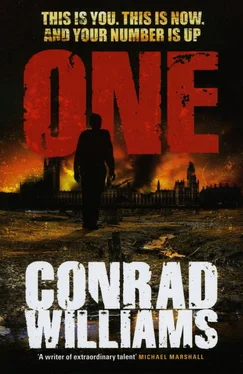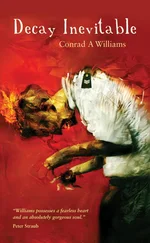Jane knew he was at the end of himself. He was a car that had been badly cared for, run into the ground, its odometer clocked. No amount of repairs was going to rescue him from a date with the crusher. Eating did not lift his spirits. Thoughts of Becky carrying the shred of his genes in her womb could not lift him out of his torpor. Worst of all, he could not concentrate for long enough to summon Stanley to the forefront of his thoughts. He was weak and tired beyond what he understood those words to mean. His soul was like an animal run over on a busy road. It had been flattened over time by so many tons of traffic that it resembled a dirty outline of what he was, who he had been. He was a memory in his own lifetime. He was dust, shadowless; he was shutting down.
The beach described a flat arc from north-east to southwest. It curved before him and it did not appear to incline towards the sea, nor erase itself against a different kind of landscape behind him. The sea seemed to join the beach at a random point, sewn on like a dark hem. It did not seem to have any depth to it. The violence that he had seen in the North Sea was gone here, as if it had spent itself. The sea was flat and black and indolent. Stiff gusts of wind drew some motion from its surface – frail, corpse-grey combers – but it was reluctant, tacked on, almost, like some remembered reconstruction of how oceans ought to behave. The fruits of a decade’s worth of slow tides lay on the sand, a scruffy, impromptu market. Orange barrels. Endless lengths of timber. Bleached streamers of plastic. Bodies face down into the sand as if trying to burrow, to escape the embarrassment of scrutiny. Buy one, get one free.
Jane rolled over onto his side, his good side. Despite the flare of pain along his arm, the flesh purpuric and angry, and the dull throb in his savaged thigh, it was comforting to sit in the shingle. He pushed his fingers through the flint pebbles, enjoying the feel of the cool stones against his skin. There was hard work going on all across the headland. The raft itself was a trembling disc of pale blue sitting on the water. It was hard to see, but it seemed to be buoyed by a series of floats lashed to its outer rim. Someone had talked of how it was necessarily open at the centre, so that more floats could be added as a counterbalance to prevent the raft collapsing.
‘We’re going to sea on a blue Polo mint,’ someone had called out, incredulous.
The peninsula was dotted with the remains of fishing boats. Beachcombers sifted through the wreckage, looking for workable pieces of wood. Sometimes Jane looked in a direction where there were no people, no buildings, and it was like viewing a moonscape. The end of the world was desolate and grey. You couldn’t see the coast of France. He thought that maybe much of the rest of the world had dissolved into the oceans. It wouldn’t take long for the same to happen here.
Jane drew himself up to a sitting position. He was with maybe twenty other wounded. Medical volunteers were slowly tending to the injuries, on a sliding scale of need. A badly burned arm and slashes to the arse were low priorities compared to the man with half his head caved in, or another with an arterial bleed. Jane watched the life puddle out of that one, turning the stones crimson. When he died, nobody cried. There was no sighing or oaths to God. Nobody turned away. The medics covered him up and moved on to the next. Two other men died before they could receive treatment, rattling away into the stones, their faces smoothing as death claimed them. It seemed almost preferable.
Eventually the medics turned their talents to Jane. He had seen one of them before, a wiry man in his forties with a tattoo of an octopus, its tentacles winding around his muscles on his forearm. Edwards, he thought his name was. He and his colleague, a younger man with black skin and alopecia, peeled away Jane’s dressings, bathed his wounds and gave him injections. The world drifted away a little. Warmth washed through him. They bandaged his thigh with clean dressings and slathered a cream on his arm that turned it chill. They put a pillow under his head and he lay down on it. Nobody had said a word. There was no need for comfort, or reassurance. You died or you lived. Everyone was beyond the niceties that once accompanied such attention.
Jane slept.
It was growing dark when he revived. The drugs had worn off and he was shivering, his arm laced with pain. Someone had tucked a blanket around him, but it was no good now. The shingle he had enjoyed the feel of earlier was now a relentless sharp digging in his back and buttocks.
‘Goes it?’
Jane jerked his head in the direction of the voice. A grainy shape folded into the shingle. Green clothes crusted with black blood.
‘I’m all right. A bit stiff, but then I’ve been feeling like that for years. Edwards, is it?’
‘’Tis.’
‘How long have you been here?’
‘Months. Since they began building the fucker. This is the busiest we’ve been for a while. The worst injuries we had before this were splinters and sprains.’ The voice sounded so tired that Jane thought it might simply fade out. He supposed everyone sounded like that now. Tired, strung out. Maybe just giving up the ghost without even realising it.
Jane scrambled to his feet and stretched, keeping his arm tucked in against him. The raft was no longer visible on the water and he thought it might have left without him, or been sunk, but his panic was short-lived. Labourers were huddled together checking plans and drinking hot water from metal cups. Fires had been started all along the beach. He heard laughter from somewhere and it almost scared him. It was such an alien sound, like the sudden cry of an attacking animal. Gradually he allowed himself to relax, to feel safe for the first time in a long time.
‘So what’s it like, back in London?’ Edwards asked him.
‘Not great,’ Jane said. ‘You got anyone there?’
‘London? No. Never set foot in the place me entire puff. Nearest I got was Leatherhead, Surrey. Grew up in Leeds. Everyone dead.’
Jane didn’t know what to say. As in most cases, he allowed the silence to build a wall between them. Then he turned and walked along the beach, his movements ungainly in the deep, shifting pebbles. Forgotten angles of machinery poked out of the ground like relics from an alien era unearthed by archaeologists. Chains and cogs and pistons and gears, larger than lorries. He felt a little like these submerged weird machines. Machines needed people to work them. Once they disappeared, or the knowledge of their purpose was lost, they became redundant, useful only for scrap. He had felt more and more rudderless in recent weeks. He felt like someone who has aged to a point where he no longer feels relevant, someone pale and lined who drifts around the periphery of things, who escapes attention because he has come to the end of his life.
He supposed that the future would come to resemble the past. Hundreds of years ago, you outlived your usefulness to the planet once you’d procreated. Life expectancy was mid-thirties. He felt another tooth coming loose. Lower incisor. Once your teeth were gone, it became harder to take in the nutrients you needed. Aches and pains everywhere. It didn’t matter any more that he knew how to weld, could determine how long to stay underwater on a tank of heliox. These were skills the world no longer needed. He was a shot bolt. He sat down again, weary, sapped to the bone.
An old woman with beautiful hair, silver and soft and long, leaned over him and asked if he was all right. He smiled at her and he saw her wince; blood in the teeth, he thought, and shut his lips. He turned away, looking at the nuclear reactors to the south, the dome of the decommissioned Sizewell A. Jane remembered his concern over these plants, but nothing had come of the threat. He remembered Becky rubbing his shoulder when he became upset that they had survived only to face an impossible future, one fraught with danger at every turn.
Читать дальше












